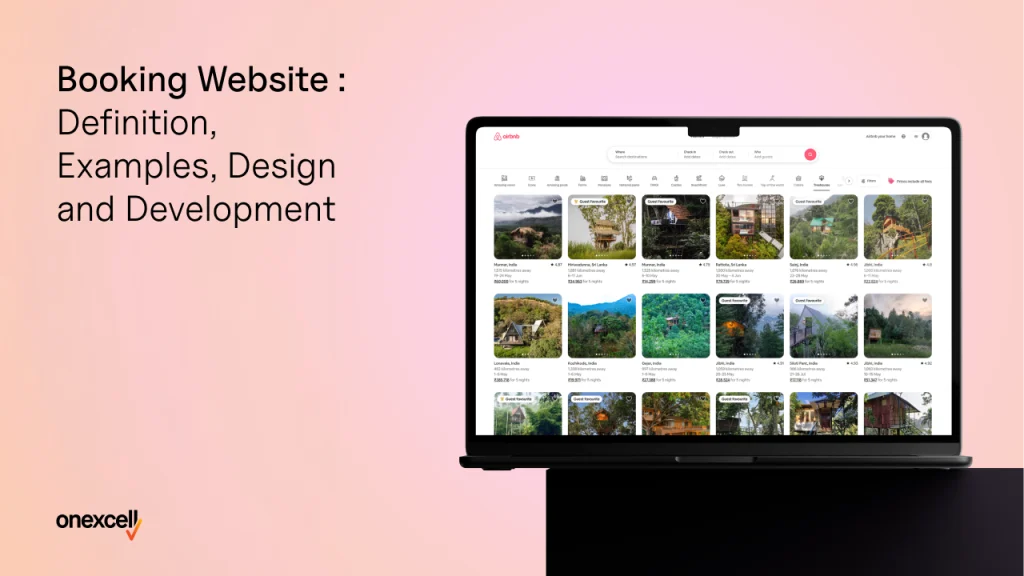A booking website is a dynamic digital platform that allows users to reserve services, accommodations, appointments, or tickets online by providing real-time availability, secure payment processing, and instant confirmations. Unlike static websites, which deliver fixed content to all visitors, booking websites generate personalised content based on user input and backend logic. This dynamic nature supports industries such as travel, hospitality, healthcare, events, and restaurants by automating reservations and improving operational efficiency.
The features of booking websites include real-time inventory updates to prevent double bookings, integrated payment gateways like Stripe and PayPal for secure transactions, automated reminders to reduce no-shows, customisable booking forms to specific business needs, mobile-optimised interfaces, calendar synchronisation, multilingual support, and customer review systems.
According to a 2023 report by Stripe, 84% of customers value the convenience of booking and paying in a single transaction, while requiring upfront payments or deposits reduces cancellations and no-shows, improving cash flow and operational predictability.
Examples of successful booking websites include Booking.com and Airbnb for accommodations, TripAdvisor for travel planning and reviews, OpenTable and Resy for restaurant reservations, Eventbrite and Ticketmaster for event ticketing, and SimplyBook.me for service-based appointment scheduling.
Designing a booking website involves planning the site structure, creating intuitive navigation, and focusing on responsive, user-friendly layouts. Developers use frontend technologies such as React, Angular, or Vue.js, and backend frameworks like Node.js, Django, or Ruby on Rails, combined with robust databases like MySQL or MongoDB. Integration with third-party APIs for payments, notifications, and calendar syncing is essential.
Popular domain registrars include GoDaddy, Namecheap, and Google Domains, while hosting providers like Bluehost, SiteGround, Kinsta, and WP Engine offer the speed, security, and scalability required for dynamic booking platforms. This approach shows booking websites deliver secure, efficient, and user-centric experiences that meet modern business and consumer demands.
What is a Booking Website?
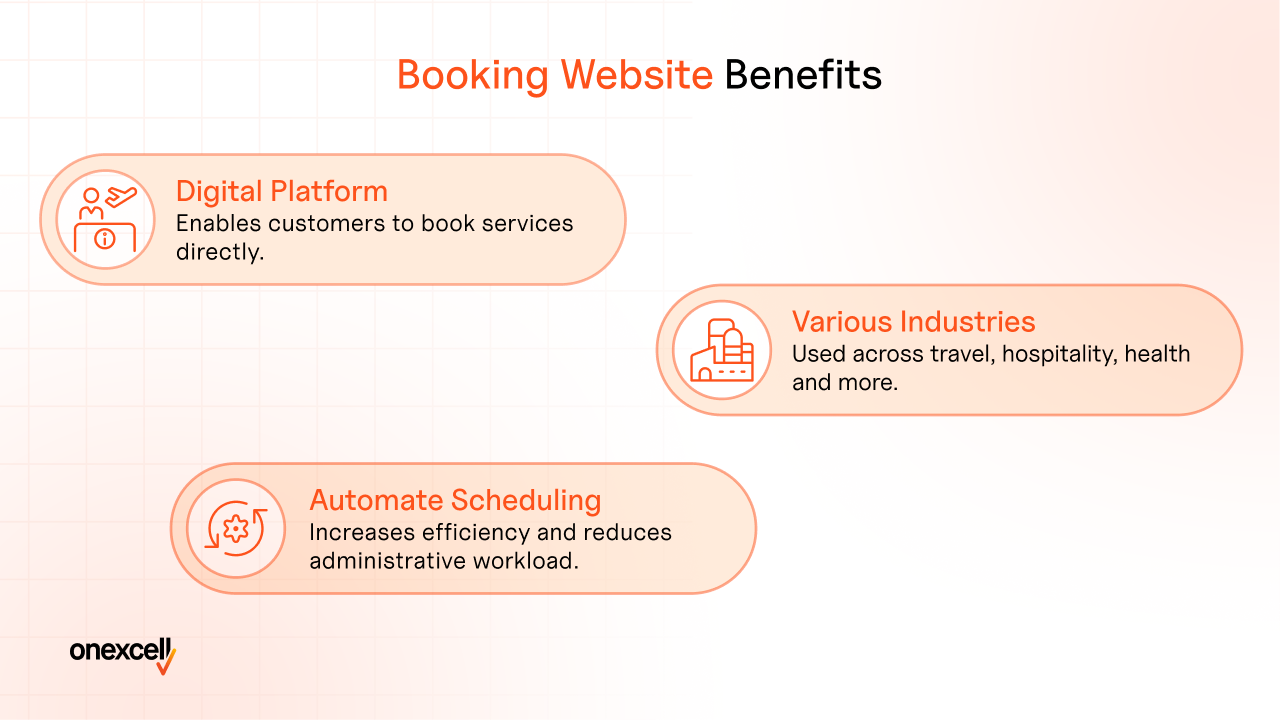
A booking website is a digital platform that enables customers to book services or schedule appointments directly through a company’s website. It is the process of making reservations for hotel rooms, airline tickets, restaurant tables, healthcare appointments, or event registrations by allowing customers to view real-time availability, select services, provide information, and make payments without call or visit in person.
Booking websites are used across various industries, including travel for flights and hotels, hospitality for accommodation and dining, healthcare for medical appointments, beauty and wellness for salon and spa services, fitness for classes and personal training, and professional services such as legal or financial consultations.
Booking websites automate appointment scheduling and reservation management that increase efficiency, reduce administrative workload, improve customer satisfaction, and help businesses better manage demand of customers.
What are the Types of Booking Websites?
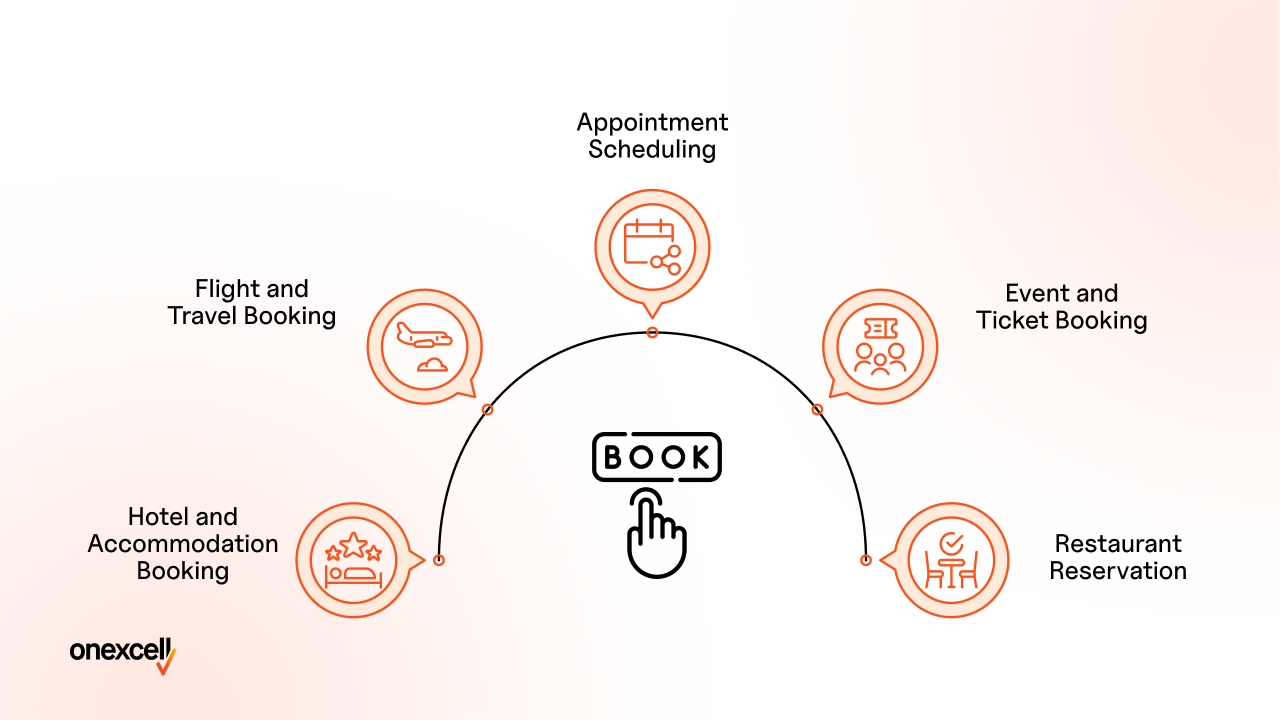
The types of booking websites include hotel and accommodation booking site, travel booking site, appointment scheduling site, event booking site, and restaurant reservation booking site.
Below are the types of booking websites.
- Hotel and Accommodation Booking
These platforms enable users to search for, compare, and reserve accommodation options such as hotels, apartments, hostels, and holiday rentals. Its examples include Booking.com and Airbnb, which provide listings, real-time availability, customer reviews, and secure online payment options. Many of these sites also offer services like car hire and airport transfers. - Flight and Travel Booking
Flight and travel booking websites allow users to book airline tickets, travel packages, and related transport services. They range from online travel agencies (OTAs) like Expedia, which purchase and resell travel services, to search aggregators like Skyscanner and Kayak that compare prices across multiple providers. Some platforms also integrate hotel, car hire, and activity bookings for travel planning experience. - Appointment Scheduling
These booking systems are designed for service-based businesses such as healthcare providers, beauty salons, fitness trainers, and consultants. Platforms like SimplyBook.me offer customisable booking pages, automated reminders, and real-time calendar management. It provides appointment scheduling for both clients and staff that integrates with business websites such as WordPress, Facebook, and other popular content management systems. - Event and Ticket Booking
Event and ticket booking websites manage reservations and sales for concerts, sports events, theatre performances, festivals, and more. Its examples are Ticketmaster and Eventbrite provide real-time seat selection, secure payment processing, and digital ticket delivery. These platforms are for organisers to manage large-scale events such as music festivals and for attendees looking for convenient, centralised ticket purchasing. - Restaurant Reservations
Restaurant booking websites allow diners to reserve tables at restaurants, with instant confirmation and real-time availability. Third-party platforms such as OpenTable and Resy not only facilitate bookings but also serve as marketing channels for restaurants, increasing their visibility to potential customers. Some systems are integrated directly into a restaurant’s own website, while others operate as independent consumer-facing platforms like DesignMyNight and Google Maps.
What are Examples of Successful Booking Websites?
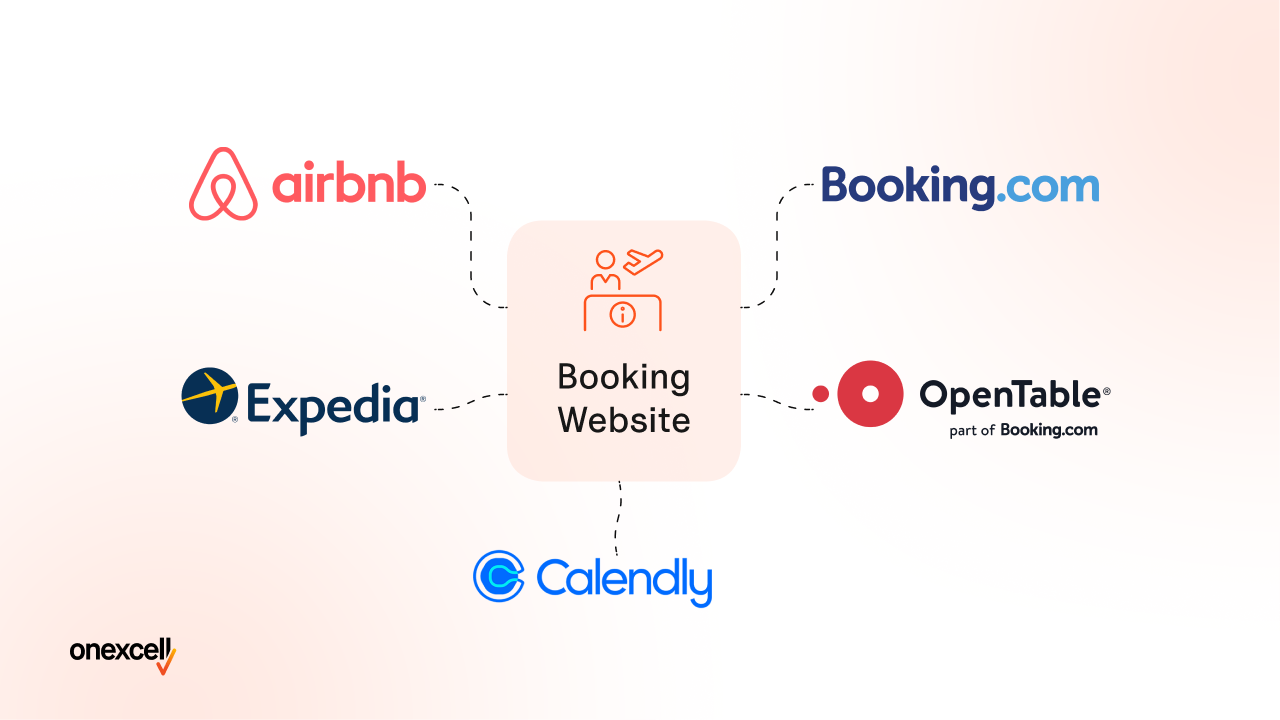
Some of the most successful booking websites include Airbnb, Booking.com, Expedia, Calendly, and Opentable. These platforms are recognised for their user-friendly interfaces, global reach, and innovative features that streamline the booking process for millions of users.
Below are examples of booking websites.
- Airbnb
Airbnb is a global leader in holiday rentals, by allowing individuals to list, discover, and book unique accommodation around the world. It offers a vast inventory, personalised recommendations, secure payment systems, and a strong community-driven review system that builds trust between hosts and guests. - Booking.com
Booking.com is one of the most comprehensive travel and hotel booking platforms, offering access to millions of properties, including hotels, apartments, and resorts. Its strengths include real-time availability, competitive pricing, verified guest reviews, and a better user experience that encourages repeat bookings. - Expedia
Expedia is a major online travel agency providing bookings for flights, hotels, car hire, and holiday packages. Its integrated approach allows users to bundle services for discounts, while its partnerships with airlines and hotels give customers flexible travel solutions such as multi-city itineraries and last-minute deals. - Calendly
Calendly is a leading appointment scheduling tool that simplifies the process of booking meetings and appointments for businesses and individuals. Its automated scheduling, calendar integration, and customisable booking links eliminate back-and-forth emails, making it a favourite for professionals and organisations. - OpenTable
OpenTable is a dominant restaurant reservation system that connects diners with thousands of restaurants worldwide. Its real-time table availability, instant confirmations, loyalty rewards, and user reviews contribute to its popularity among both restaurants and customers.
What are unique features of booking websites?
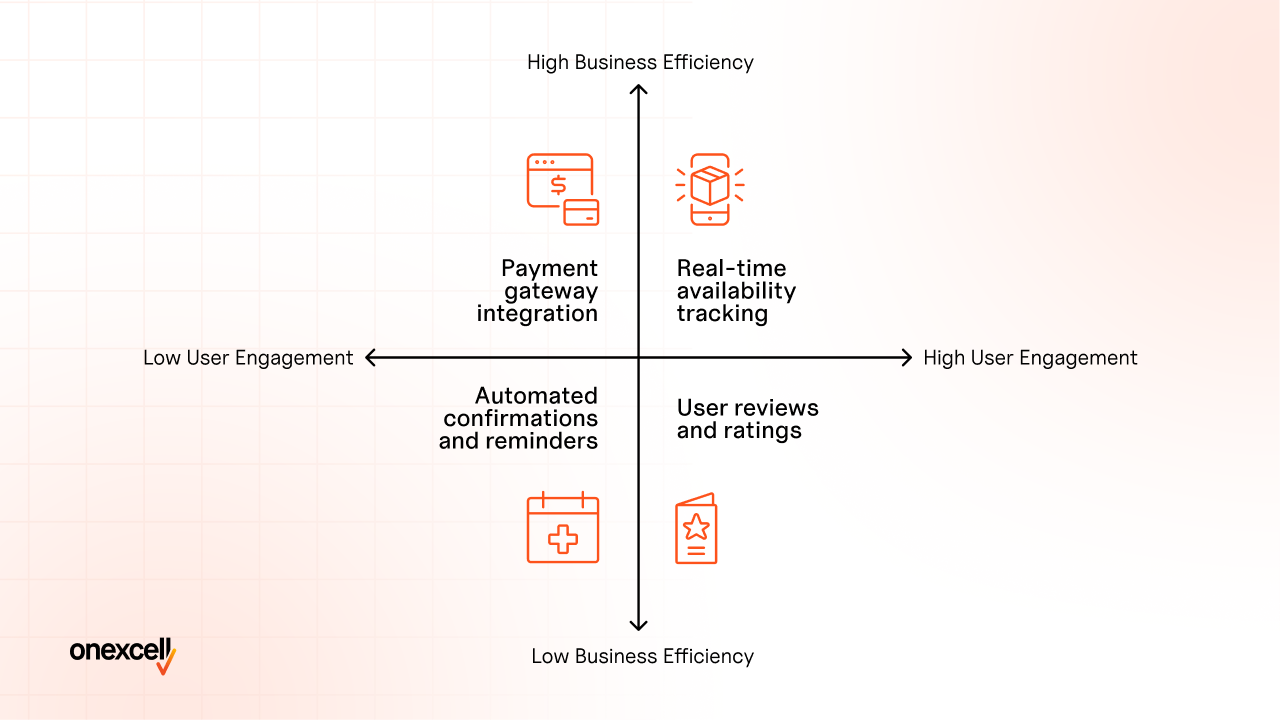
Unique features of booking websites include a combination of advanced functionalities like real time availability, payment gateway integration, automated reminders and many more. These features are designed to provide convenience, transparency, and reliability for both customers and service providers.
Below are the unique features of booking websites.
- Real-time availability tracking: Booking websites display up-to-date availability for services, rooms, or appointments, and users only book slots that are actually open. This minimises double bookings and provides immediate confirmation, improving trust and satisfaction.
- Payment gateway integration: Secure online payment options such as Stripe and PayPal allow customers to pay for their reservations instantly through integrated gateways. This feature supports various payment methods including credit and debit cards like Visa, MasterCard, AMEX, digital wallets such as Apple Pay, Google Pay, increases convenience, and helps businesses manage transactions efficiently.
- Automated confirmations and reminders: Once a booking is made, automated emails or SMS notifications confirm the reservation and send reminders before the appointment or stay. This reduces no-shows, keeps customers informed, and saves administrative time.
- Multi-device responsiveness: Modern booking websites are designed to work across desktops, tablets, and smartphones. Responsive design offers a smooth and consistent booking experience regardless of the device used.
- User reviews and ratings: Many booking platforms feature customer reviews and ratings, allowing users to share their experiences and help others make informed decisions. This transparency builds trust and influences booking choices, as seen on major platforms like Booking.com, Hotels.com, and Tripadvisor.
- Customisation and personalisation: Businesses customise booking forms, branding, and offers to match their unique identity and customer preferences integrating their logo and brand colours. Personalisation features, such as targeted discounts and local language options, create a more engaging and relevant user experience.
- Intuitive and accessible design: User-friendly interfaces, clear calls-to-action, and accessible navigation make the booking process easy for all users, including those with disabilities. This broadens the platform’s reach and increases conversion rates.
- Integration with business tools: Booking systems are connected with calendars, CRM software, and marketing tools, enabling better management of schedules, customer data, and follow-up communications.
What are the Steps to Design a Booking Website?
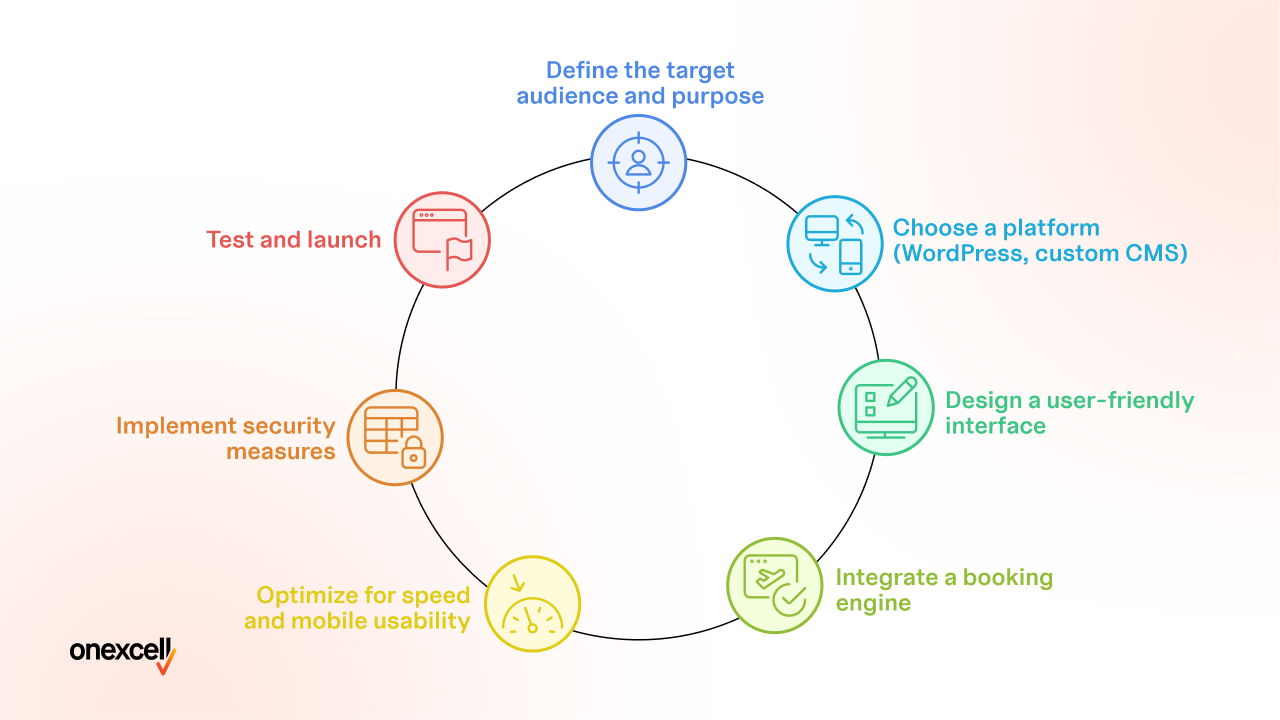
The key steps in designing a booking website are important for creating a platform that is both user-friendly and effective in managing reservations. Web design services provide customers with easy navigation, instant booking , and pay fast while managing reservations and operations.
Below are the steps to design a booking website.
1. Define the target audience and purpose
2. Choose a platform (WordPress, custom CMS)
3. Design a user-friendly interface
4. Integrate a booking engine
5. Optimize for speed and mobile usability
6. Implement security measures
7. Test and launch
- Define the target audience and purpose
Start by identifying who your booking website is for (e.g., travellers, patients, diners) and what services it will offer. Understanding your audience’s needs and the specific goals of your platform will shape all design and functionality decisions.
- Choose a platform (WordPress, custom CMS)
Select the right platform or website builder based on your technical skills, budget, and scalability needs. Popular options include WordPress with booking plugins, custom CMS solutions, or all-in-one builders like Wix or Hostinger, which offer templates and integrated booking tools for various industries.
- Design a user-friendly interface
Create a clean, intuitive layout that reflects your brand and is easy for users to navigate. Use clear calls-to-action (like “Book Now”), simple navigation menus, and a visually appealing colour scheme. Ensure your design is mobile-friendly, as a large portion of bookings are made on smartphones.
- Integrate a booking engine
Add a robust booking system that allows users to view real-time availability, select services, and complete reservations. The booking engine should support features like calendar synchronisation, automated confirmations, and payment processing to streamline the experience for both users and administrators.
- Optimise for speed and mobile usability
Ensure your website loads quickly and functions smoothly across all devices. Use responsive design techniques and optimise images and scripts to enhance performance. A fast, mobile-optimised site reduces bounce rates and increases conversion.
- Implement security measures
Protect user data and transactions by integrating SSL certificates, secure payment gateways, and regular security updates. Compliance with data protection regulations (like GDPR) is essential for building trust and safeguarding sensitive information.
- Test and launch
Before going live, thoroughly test every aspect of the website, including the booking process, payment flow, and mobile responsiveness. Simulate real user journeys to identify and fix any issues. Once testing is complete, launch your website and monitor its performance, making ongoing updates as needed to ensure a better booking experience.
How are Booking Websites Developed?
Booking websites are developed using a blend of frontend and backend technologies such as React, Angular, or Vue.js for the frontend and Node.js, Django, or Ruby on Rails for the backend, robust database management systems like MySQL, PostgreSQL, or MongoDB, and integration with third-party APIs like Stripe for payments and Twilio for notifications.
The process of developing booking websites begins with thorough market research and planning to define the target audience, business goals such as increasing online reservations and improving customer satisfaction, and essential features like real-time availability, secure payment processing, automated notifications, and reporting and analytics.
On the frontend, website development involves using technologies like HyperText Markup Language (HTML), Cascading Style Sheets (CSS), and JavaScript frameworks such as React, Angular, or Vue.js) to build intuitive, responsive user interfaces that work smoothly across various devices such as desktops, laptops, tablets, and smartphones. This shows that individual users easily navigate through menus, perform searches, and complete booking transactions whether they are using a desktop computer or a smartphone.
The backend programming of booking website is done using languages and software engineering frameworks like PHP, Python frameworks as Django or Flask, Ruby on Rails, or Node.js, which handle the core business logic, user authentication processes, and communication with databases and the booking engine.
A core component is the integration of a booking engine, built as a custom software module or added through third-party software plugins, which manages real-time availability calendars, appointment scheduling, and automated booking confirmations.
Payment gateway application programming interfaces (APIs) such as Stripe or PayPal are integrated to securely process financial transactions, while calendar APIs like Google Calendar synchronise booking schedules for both individual users and service providers.
Database management systems of booking websites are critical for storing user profiles, booking records, service listings, and payment histories. Popular database management systems include My Structured Query Language (MySQL), PostgreSQL, and MongoDB, chosen for their reliability and scalability.
Security measures, such as Secure Sockets Layer (SSL) encryption, secure user authentication protocols, and regular software updates, are implemented to protect sensitive customer data and maintain user trust.
Finally, the website undergoes software testing to make sure that all booking workflows, payment processing systems, and notification mechanisms work correctly across multiple web browsers and device types. After launch, ongoing website maintenance, performance monitoring, and optimisation efforts are important to keep the booking website secure, fast, and user-friendly.
What is the best domain and hosting provider for booking websites?
The best domain and hosting providers for booking websites depend on your business size, technical requirements, and the level of performance and support you need. For a booking website, reliability, uptime, speed, and security are critical, as minor downtime or slow load times result in lost reservations and revenue.
Bluehost is highly recommended for small to medium-sized businesses due to its all-in-one packages, which include a free domain for the first year, free SSL, daily back-ups, and integration with WordPress. Bluehost boasts a 99.9% uptime guarantee and offers managed WordPress hosting, making it ideal for businesses that want a set-up and strong support. Bluehost hosts over two million websites globally and offers plans starting from £2.26/month, with storage options up to 100GB SSD and free CDN for faster performance.
SiteGround is another top choice, known for its 24/7 customer support, high-speed infrastructure, and advanced security features. SiteGround’s uptime consistently exceeds 99.99%, and its hosting environment is optimised for booking systems with features like automatic daily back-ups and advanced caching.
For businesses with more complex requirements or expecting high traffic, Amazon Web Services (AWS) provides scalable cloud hosting. AWS offers virtually unlimited resources, advanced security, and global data centres, which support enterprise-level booking platforms. AWS’s infrastructure is trusted by major brands and provides granular control over server resources, but it requires more technical expertise to manage.
When selecting a domain provider, Domain.com and GoDaddy are leading registrars offering a wide range of top-level domains (TLDs), domain privacy protection, and easy management tools. Domain.com provides over 300 TLDs, domain privacy, and professional email integration, with domain prices starting at £8.81 for .com extensions. GoDaddy manages more than 80 million domains and offers bulk search, privacy protection, and domain backorder services, making it a strong choice for businesses seeking brand protection and scalability.
How to customise the design to align with brand identity?
To customise the design of a booking website involves aligning every visual and interactive element with your brand identity to create a cohesive, memorable, and professional user experience. This starts with prominent logo placement and the use of a consistent colour scheme that matches your brand’s palette, so that visitors instantly recognise your business.
Custom web design also means personalizing copy such as introductions, service descriptions, and call-to-action buttons to reflect your brand’s tone and values, making the site feel authentic and engaging. Advanced platforms and builders now allow businesses to embed the booking system directly into their main website, while localization options like multiple languages and region-specific content help your brand connect with a broader audience
Embedding the booking system directly into your main website, while localisation options such as multiple languages and region-specific content help your brand connect with a broader audience. Advanced personalisation, like remembering user preferences, offering recommendations, and displaying dynamic content based on user behaviour that elevate engagement and loyalty.
Is syncing availability and setting up a booking form important?
Yes, syncing availability and setting up a booking form is important for modern booking websites or appointment-based business. Real-time scheduling makes sure that the availability is always up to date across all platforms, which prevents double bookings and scheduling conflicts, which is a major source of customer dissatisfaction and lost revenue.
According to an AutoLoop study cited by Digital Dealer and Affinitiv, Millennials account for 25% of all appointments booked online, and this rate has increased by 6.5% over the past three years, highlights the importance of automated, always-available booking systems for capturing more businesses.
What role does payment integration play in a booking system?
Payment integration in a booking system plays an important role in enhancing convenience, streamlining operations, and reducing no-shows by allowing customers to pay securely and instantly at the time of booking. Leading payment gateways like Stripe, PayPal, and Square enable users to complete the entire reservation and payment process in one better transaction, eliminating the need for manual invoicing or follow-up payments.
This integrated approach of booking site systems not only saves administrative time but also reduces the risk of abandoned bookings and increases conversion rates.
According to recent industry statistics cited by Moldstud and SennaLabs, businesses that integrate payment gateways with their booking systems see an average revenue increase of 20–30%, while requiring payment at the time of booking reduces no-shows and late cancellations, improving financial predictability and operational efficiency.
Secure payment integration also builds trust, as modern gateways use encryption and compliance protocols to protect sensitive data, making customers more likely to complete their transactions online. Payment integration transforms the booking process into a streamlined, secure, and efficient workflow that benefits both businesses and their clients.
What is a prototype in booking website development?
A prototype in booking website development is a preliminary, interactive model that visually and functionally represents the layout, user flow, and core features of the final website before any actual coding begins. It serves as a bridge between initial concepts and full-scale development, allowing designers, developers, and stakeholders to visualise, test, and refine the booking process, navigation, and user experience in a risk-free environment.
Prototypes range from low-fidelity wireframes to simple sketches outlining the structure to high-fidelity, clickable models that closely mimic the look and feel of the finished product, including elements like booking forms, calendars, and confirmation screens.
The role of a prototype enables teams to identify usability issues, gather feedback from stakeholders and potential users, and make informed design decisions early, saving time and resources during later development stages. Tools such as Figma, Adobe XD, and Sketch are widely used for creating prototypes, offering collaborative features and interactive components that help simulate real user interactions with booking flows and interfaces.
Does prototyping help in testing the functionality of booking websites?
Yes, prototyping helps in testing the functionality of booking websites by allowing stakeholders and real users to interact with an early version of the site, identify usability issues, and validate whether core booking features work as intended.
Interactive prototypes enable users to simulate real tasks such as searching for availability, filling out booking forms, and navigating the reservation process without the need for fully developed code. This hands-on testing uncovers flaws in user flows, confusing elements, or technical gaps early in the development cycle, making it possible to refine the design and functionality before resources are invested.
According to a study published by the Nielsen Norman Group, early-stage usability testing with interactive prototypes reduces development time and costs by up to 50% by identifying and resolving usability issues before coding begins.
Feedback from tools like UserTesting, Maze, or Hotjar provides actionable insights such as click patterns, task completion rates, and navigation bottlenecks that enable teams to make data-driven improvements.
How does a booking website compare with a business website?
A booking website and a business website serve different purposes, to meet specific needs of businesses and their customers. Booking websites focus on enabling real-time reservations and seamless transaction processing, business websites provide information about products, services, and company details to build brand awareness and support marketing efforts.
The table below compares a booking website with a business website.
| Aspect | Booking website | Business Website |
| Primary Purpose | Facilitates online reservations, appointments, or service bookings in real time. | Provides information about the business, products, or services without necessarily enabling direct bookings. |
| Core Functionality | Integrated booking engine with real-time availability, calendar syncing, and automated confirmations. | Informational content, company details, contact forms, and sometimes basic inquiry forms. |
| User Interaction | Allows users to select dates, times, and services, and complete transactions online. | Mainly focused on browsing information, learning about offerings, and contacting the business. |
| Operational Hours | Available 24/7 for customers to book anytime without human intervention. | Updated by the business but does not support round-the-clock interaction. |
| Administrative Benefits | Automated appointment scheduling, payment processing, and client management, reducing manual workload. | Primarily supports marketing and brand presence, with limited automation of business processes. |
| Marketing Impact | Enhances local SEO through service-specific keywords and encourages repeat bookings through personalised experiences. | Builds brand awareness and credibility, serving as a hub for marketing campaigns and customer engagement. |
| Examples of Use | Salons, healthcare providers, hotels, travel agencies, event organisers. | Corporate sites, portfolios, informational pages, blogs, and general business presentations. |
| Revenue Generation | Directly contributes to sales by converting visitors into paying customers through bookings. | Indirectly supports sales by providing information and generating leads. |
